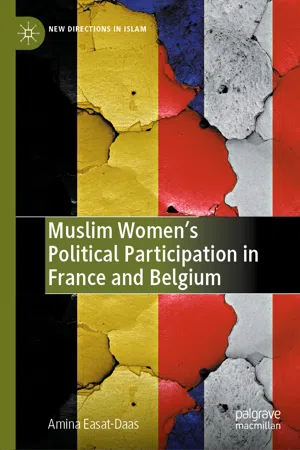There are an estimated 38 million Muslims in Europe. European Muslims are ethnically, culturally and religiously diverse and make up approximately 6% of the European population (Pew Forum 2015). In spite of the significant presence and contribution to European society, Muslims are typically constructed as the threatening ‘other’. Dominant Islamophobic narratives employ Orientalist tropes1 and frame Muslimness as being threatening on multiple levels; a threat to hegemonic culture, as posing economic and demographic threat, a source of violent threat, inherently barbaric, sexist and as being prone to backward thinking.2 Such narratives also specifically frame Muslim women as simultaneously and paradoxically both in need of saving and increasingly symbolic of threat, and thus based on these common perceptions their political participation in the West is rarely considered.
Given their sizeable presence, it is unsurprising that European Muslims seek to participate in democratic European political institutions and that this participation often brings benefit to broader society. For example in the UK, Muslims involved in politics promote civic engagement among the wider British Muslim community and are better able to assist potentially marginalised British Muslims than other non-Muslim politicians (Sinno and Tatari 2009). Muslim political participation and representation encourages diversified political inclusion, strengthens and enforces national democratic principles and processes (Zibouh 2013).
Muslim political representation brings diversity to the political arena. Muslims effectively build multi-ethnic coalitions within their political careers and thus their presence contributes to lessening racism and discrimination in the political sphere (Sinno and Tatari 2009). Muslim political representatives are often positive role models for young Muslims (Sinno and Tatari 2009).
Nonetheless in spite of the significant European Muslim presence and the multiple benefits brought about by Muslim political participation, Muslims often find themselves politically underrepresented (Klausen 2009). For example, in Germany Muslims make up 4% of the wider population and only occupy seven of the 614 seats in the Bundestag (Sinno 2009a).3 Put alternatively; German Muslims only constitute 0.81% of the German lower parliamentary chamber and are absent from the upper house. Similarly, Greek Muslims make up 3.5% of wider society, yet they only constitute 0.33% of the Hellenic Parliament (Sinno 2009a). Worse still, France has the largest Muslim population in the West at an estimated 8% of the wider community (Pew Forum 2009; Sinno 2009a), and yet of the total 9084 seats in the two chambers of the French parliament, only five are occupied by French Muslims (Sinno 2009a). Proportional to the population size, French Muslim political representation is proportionally poorest in France at a ratio of 1:0.07. These generally low rates of Muslim national political representation in the West persist in spite of the suggested increasing rates of political participation by Muslims post-1990 and 9/11(Back et al. 2009; Sinno 2009a; Yazbeck Haddad and Ricks 2009).
Conversely, some European Muslims enjoy higher rates of parliamentary representation. For example, in the UK there are eleven elected national parliamentarians and similarly twelve in Belgium (Sinno 2009a).5 This means that the UK and Belgium have among the highest numbers of Muslim parliamentarians in Europe. However, closer inspection reveals British Muslims still only constitute 0.8% of the national parliament, therefore indicating that proportional to population size British Muslim national political representation is still relatively low at a ratio of 1:0.24 (Sinno 2009a). As well as having the highest number of Muslim national political representatives, Belgium appears the only case in Europe where Muslims are not politically underrepresented. At a ratio of 1:1.35, proportional to Muslim population size Belgian Muslims are politically overrepresented at the national level (Sinno 2009a), thus indicating the exceptionalism of Belgium.
Table
1.1 is adapted
from Sinno (
2009a) and details the rates of Muslim national
political representation in Western European cases where Muslims constitute at least 2% of the overall population. The data is presented in rank order ranging from the highest to lowest proportional rates of
representation.
Table 1.1Muslim political representation in Europe (Adapted from Sinno 2009a: 72–75)
Country | Percentage Muslim population | Total number of parliamentary seats | Number of Muslim parliamentarians | Percentage of Muslim parliamentarians | Ratio of percentage Muslim population to percentage Muslim parliamentarians |
|---|
Belgium | 4 | 221 | 12 | 5.4 | 1.35 |
Netherlands | 5.8 | 150 | 7 | 4.67 | 0.81 |
Denmark | 3.7 | 179 | 3 | 1.6 | 0.45 |
Norway | 1.7 | 169 | 1 | 0.59 | 0.35 |
European Parliament | 3.3 | 732 | 8 | 1.09 | 0.33 |
Sweden | 3.9 | 349 | 4 | 1.15 | 0.29 |
UK | 3.3 | 1367 | 11 | 0.8 | 0.24 |
Germany | 4 | 614 | 5 | 0.81 | 0.20 |
Greece | 3.5 | 300 | 1 | 0.33 | 0.09 |
France | 8 | 908a | 5 | 0.55 | 0.07 |
The stark disparities in terms of Muslim parliamentary representation in neighbouring France and Belgium contribute to the rationale behind comparatively studying Muslim women’s political...
